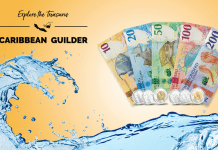By Heavenest St. Cyr
TCI / Holland — VHL university student Heavenest St. Cyr, originally from St. Maarten, travelled from the Netherlands to the Turks and Caicos Islands (TCI) to research the effects of the Covid pandemic on a local community, from April to June this year.
The research served as the student’s thesis for the study of Disaster Risk Management at the Van Hall Larenstein (VHL) University of Applied Sciences. The thesis was done in collaboration with the local TCI Salvation Army.
The district of Five Cays was selected as the location that the research focused on. It is a community with a higher percentage of low-income households. It also has a higher percentage of immigrants, some of whom are undocumented. This was interesting as the socially marginalized, with less financial capacity, are typically less able to withstand the impacts of a disaster and may more likely be affected by the pandemic’s negative economic effects.
The question to be answered was: “What effect does the Corona pandemic have on households’ capacities to prepare for hurricanes in Five Cays, Turks and Caicos Islands?” The objective was to understand how the Corona pandemic has been affecting the needs of the Five Cays community and their ability to prepare for hurricanes. This would then help to choose the most suitable interventions that would help the community prepare for hurricanes.
The thesis delved into discovering what household assets that are useful for hurricane preparations have been reduced the most by the Corona pandemic; understanding households’ vulnerabilities to hurricanes that have been derived from the pandemic; and learning what the safety nets have been provided by the government and non-governmental organizations (NGOs) to reduce the pandemic’s negative effects on the community’s capacities to withstand hurricanes.
Data was collected by conducting a household survey, and having interviews with the Department of Disaster Management and Emergencies (DDME), the Turks and Caicos Islands Salvation Army, and several locals to get a deeper understanding of people’s experiences.
It was expressed by those interviewed and surveyed that the cost of living in TCI has risen. As a result, it has been more difficult, especially for those with less financial capacity, to maintain their well-being. This has contributed to households consuming less food, which was revealed by the survey results. The cost of living also reduced households’ capacity to quality housing that do not meet building code standards. With less money, households have less ability to budget or save for resources that would help to mitigate the risks of hurricanes. Thus, some Five Cays households may experience a potentially devastating hurricane, and have less financial capacity to prepare their homes.
The results from the thesis reveal that the pandemic has had the most negative effect on households’ abilities to save/ budget in case of a hurricane, to purchase food, and to purchase materials and tools needed to reinforce accommodations for a storm.
It can be argued that the community’s vulnerability is derived strongly from the heavy dependency on tourism. Economies dependent on only one type of main industry are generally more vulnerable to economic shock. So, the addition of mandatory travel restrictions and lockdowns diminishes revenue from tourists, which then “stresses” the economy. Those effects are felt in the end by some households who will then start to earn less income or lose their jobs.
The most common strategy in use by households to cope with the financial strain of the pandemic is the consumption of less (either buying or just eating). In fact, 68% of survey respondents report buying or eating less food. Moreover, a slight majority of households state that in order to withstand the hardships of a major hurricane, they get help from friends, churches or entities like The Salvation Army or Red Cross. The most common resources they are aided with are food, money and shelter.
Through the research, it was found that starting in 2020, the Turks and Caicos Islands government has been carrying out an economic stimulus programme, which is a series of financial grants to residents of the country to assist with the financial difficulties of the pandemic.
The first was the TCI Stimulus Package, which was a one-time payment of USD 1,200 given to laid-off workers in the hospitality industry. The second assistance was the Coronavirus Business Assistance Grant (2020), which were cash grants issued to small and medium-sized businesses. These businesses would have received grants depending on the number of employees. The third assistance was the Social Enhancement Aid Covid-19 Stimulus (2020). Once a month, from May to July 2020, USD 200 worth of food vouchers were given to the programme’s applicants by the Department of Social Development (Welfare). Applicants had to have been Turks and Caicos Islanders, unemployed, and not eligible for any other financial assistance under the (TCI Weekly News, 2020).
In 2021, there was the Citizens Stimulus Cheque, which was a one-time provision of USD 1,000 given. According to Premier Charles Washington Misick (2021), “the stimulus package aims to provide Turks and Caicos Islander status holders and British Overseas Territory Citizens with the payment to supplement household income to cover any shortfall; be it rent, medication, utilities, childcare, food.”
However, unlike the vouchers, which were for the most vulnerable citizens, the Stimulus Cheque was available to all of the population who have Turks and Caicos or British Overseas Territory citizen status, are over 18 years of age, and are permanent residents in the Turks and Caicos Islands for at least one year (Defralien, 2021).
In terms of hurricane preparation, the Department of Disaster Management and Emergencies (DDME) has been giving training and coordinating hazard preparation in the community via online platforms instead of in person. The DDME is also expanding the number of available hurricane shelters to reduce potential infection rates to those in the community who may use these shelters.
The Salvation Army is also in the process of building a church that could also be used as a hurricane shelter. The Salvation Army will continue to help provide relief supplies from overseas partners if a disaster occurs, due to a hurricane, to aid communities.
In the end, the following recommendations were made to the Salvation Army:
1. Continue distributing food and other resources to Five Cays to help households meet their daily needs. Resources should be locally procured as much as possible to protect local livelihoods and the economy.
2. Consider cooperation with the local government to provide food vouchers to the most vulnerable.
3. Prepare food security related interventions in case of a major hurricane.
4. Distribute home reinforcement materials and tools because half of the households surveyed indicated the need for such materials to reinforce their homes against hurricane-force winds due to feeling that their homes are unsafe against a hurricane.
5. Recommend to the government to share knowledge on the most financially efficient ways to reinforce homes using the right resources to enhance home preparation.
6. Continue to assist in shelter management by providing extra space, if possible, and provide extra sleeping cots to help shelters extend their sleeping spaces to curb the spread of the virus.
All things considered, the pandemic has affected households’ financial ability to sustain their well-being and to access assets that help prepare for hurricanes. Households may become more susceptible to hurricane damage. Households generally recognize that the pandemic has affected their well-being and ability to prepare for storms.
The main issues are the ability to provide as much food as before due to the increased cost of living, which also reduced the ability to save/budget for assets needed for hurricane emergencies. The greatest perceived needs are: shelter, food, water and materials/tools needed to secure homes against hurricanes.






























